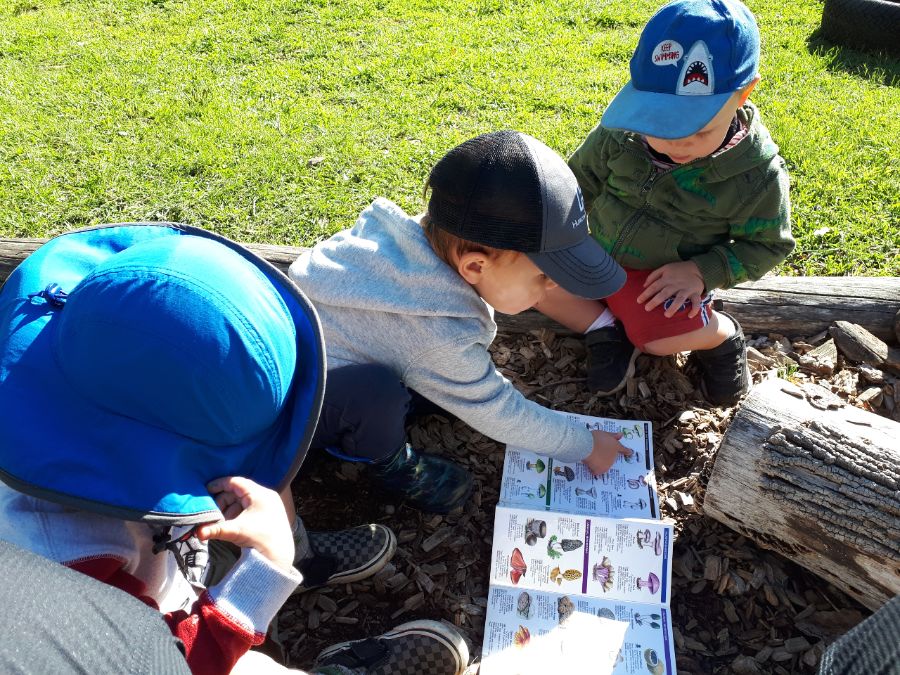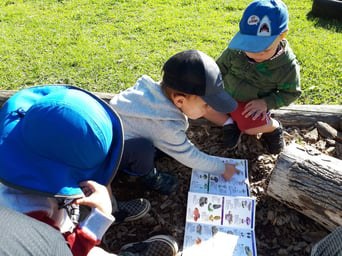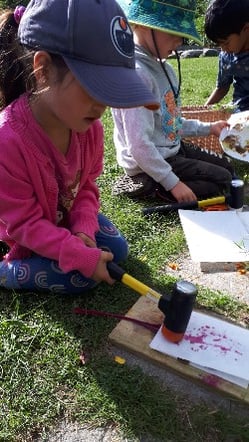
Relationships, community, belonging and understanding our why. This is where our journey began. Karen and I facilitated a 3-month professional development series with the passionate and inspiring educators from Simcoe EarlyON in January 2022. This series was titled: “The WHY/HOW/WHAT” of Nature-Based Learning. This topic is dear to our hearts as we grow to understand the value of creating space for educators to understand their WHY before we can tackle the how and the what of our curriculum and pedagogical practices.
This series was born out of a desire to bring the EarlyON community together in our post-COVID times and to use this as an opportunity to build relationships across the County of Simcoe and co-construct the vision that the EarlyON educators have for their outdoor spaces.
This series is deeply rooted in a why/how/what framework that we are so passionate about. This concept is anchored in the work of Simon Sinek. His why/how/what framework is offered to leaders and organizations. We learned about Simon Sinek in our journey of growth and change throughout the pandemic. His theories and ideas are transferable and we believe, so needed, to respond to the times we find ourselves in as educators.
We have used his ideas to think deeply about our professional development offerings and they aligned with what we believed to be true: educators need space to think about why they do what they do before we can ask them to think about what or how they aspire to do. This is an important observation that we had in our sector; that many opportunities focused on recipe lists and step-by-step guides and we know that the work of an educator is unique to every classroom. Professional development cannot be a one size fits all approach. Our work with EarlyON set out to create a once-in-a-lifetime learning opportunity to engage in regular and repeated ideas and experiences over time, with a group of the same educators to learn, unlearn, and critically examine our practice.
Our professional development series was built from the values of:
- Relationships
- Community
- Critical thinking
- Emergent Curriculum
- Reciprocity
Our professional development work is deeply rooted in parallel practice and we use the same values, strategies, and sensibilities that we aspire to see educators use in their work with children. We notice that when we hold close to these values, this allows us to create the same relationship-based conditions that we hope to see in all Early Learning programs in Ontario. We know that educators deserve opportunities to feel a sense of belonging and community and this will allow them to create these same conditions for children.

This series was focused on 3 big ideas and spanned over 3 months. The educators participating in this series were offered three learn-at-your-own-pace modules, followed by 3 virtual Zoom sessions. We facilitated opportunities to dig deeper into the theories and ideas offered in the modules and understand how this can generate new ways of being in the EarlyON programs. The thread that held this all together was our online Community of Practice. This is a virtual space that is private for all of the participants to remain connected, share ideas, problem solve, and share examples of the ways the theories and ideas offered were generating new ways of being in their programs.
The topics we offered Modules and Zoom sessions included:
- My role in cultivating an ecological identity
- Rituals and routines that grow a connection to place
- Environments that provoke joy, wonder, and awe
The online modules and Zoom sessions were created by our team at Discovery Professional Learning with multi-modal offerings such as videos, articles, and reflections that allowed educators to dig deeper into their practice in a virtual, learn-at-your-own-pace environment. When we came together as a group, we noticed how our emphasis on the "why" allowed educators to look at their work in new ways that they hadn’t experienced before.
The 30 committed educators from EarlyON thought together for over 10 hours about the ways they hoped to think about their outdoor curriculum and pedagogy and this created new possibilities for children and families to foster a connection to place.
Some of the big takeaways from the series included:
- Adventure Bags: We curated and provided each team with their very own Adventure Bag. This is a great resource that can help any early learning program overcome the barriers to getting your program outside. We understand the realities of early learning programs and that educators have big aspirations about getting children outside but some variables may get in the way. An adventure bag is a backpack that has a variety of nature-based materials that can be readily accessible for educators to use to respond to children’s natural curiosities. Some of these items include field guides, magnifying glasses, measuring tapes, binoculars and so much more! Check out our free resource on how to curate your very own adventure bag for your program and strategies to use and facilitate these materials in your classroom.
-1.png?width=200&name=Untitled%20(200%20%C3%97%2050%20px)-1.png)
- Core Routines for Nature Connection: If you are an educator curious about getting your program outside but have limited space or resources, or you simply don’t know where to start. We encourage you to check out Jon Young’s invaluable resource: Coyote’s Guide to Connecting with Nature. This resource provides educators different skills to integrate into your program immediately that help foster a connection to place. It is a great resource regardless if you are new to outdoor education or if you have been spending decades in a forest. It is a rich resource that provides research and theory and then follows up with over 100 pages of “how-to’s.” This is one of our go-to favourite resources for educators working with infants up to school-aged children. It has transformed our practice and helped us see that regardless of your location, you can integrate intentional acts that will connect children to the natural world. As seen on: Coyote's Guide to Nature Connection
We know that common practices in professional development involve a standardized approach that provides a copy-and-paste guide on what educators can do in their programs. We know that learning is so much more than a one size fits all approach and we must provide opportunities for educators to ask these never before asked questions of their practice. We believe we have a responsibility to offer a different approach to professional development and this in turn can provide the context for a new way to see children’s competence, learning, and education.
This series reaffirmed for us that educators are complex and rich in diverse wisdom and that if we allow the time and space to slow down to think critically alongside educators, the possibilities for the future of education are bright and brilliant.

Nature-based curriculum and pedagogy are so much more than a list of things to do or resources to buy. It is a thoughtful and intentional approach that requires a deep understanding of values. It is an introspective journey that requires us to allow educators to think about why they do what they do, what they are passionate about, and what future they want to be a part of creating. We saw firsthand how this slow and thoughtful approach allowed educators to see the value of asking these important questions first and see themselves and children in new and deeper ways. We feel passionate that this purpose and values-driven approach to education is the antidote to burnout that we see in the sector. We are on a mission to help as many educators find purpose and meaning in their work because we know that when this potential is unlocked, the benefits for the educator, families, communities, and children are endless.
%20(1).png?width=200&name=Untitled%20(200%20%C3%97%2050%20px)%20(1).png)
